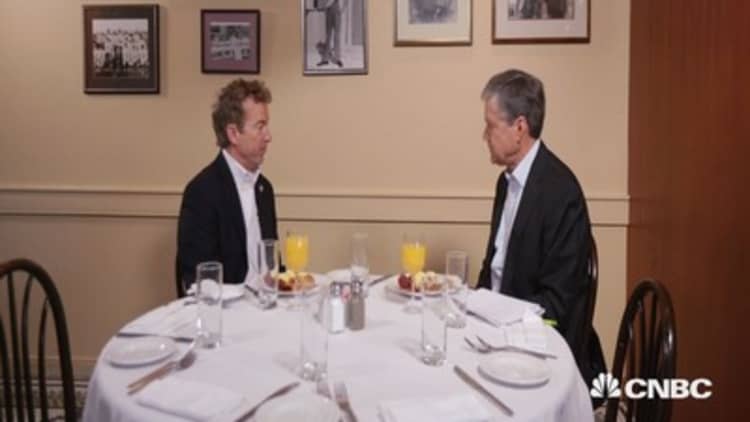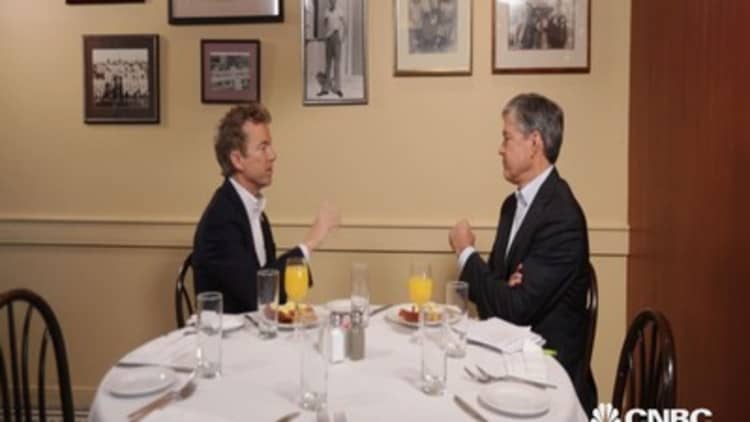



In the campaign some supporters dreamed of, Sen. Rand Paul of Kentucky would be in the thick of the 2016 Republican presidential race right now.
He would have started with the significant organizational base that helped his father, Ron Paul, finish third in delegates won and fourth in votes received in the 2012 Republican nomination fight. And the younger Paul would have expanded on his father's appeal among libertarians through outreach to minority voters as well as younger ones.
There's no sign that it's worked so far.
Nationally, Paul ranks eighth among Republican candidates in the latest RealClearPolitics polling average with 2.7 percent. In Iowa, where his father finished third with 21 percent, Paul ranks ninth at 3.3 percent. In New Hampshire, where his father finished second with 22.9 percent, he's also ninth at 3.3 percent. In South Carolina, where his father finished fourth with 13 percent, he ranks 10th at 2 percent.
Some analysts fault Paul's attempts at outreach for muddling his message. Others say rising fears about the Islamic State have eroded the appeal of his noninterventionist foreign policy stance. Paul himself, pointing to the surprising rise of Donald Trump, cites something different.
"We do live in a celebrity culture," Paul said in an interview at a Washington restaurant. "And when a celebrity decides to run for office, particularly, there's somewhat, I would call, self-reinforcing news cycle. And so everywhere you look, all day long, he's on TV.
"People can say, 'Well, that's because he's popular and people watch him,'" Paul added. "That's true. But I don't think it necessarily is helpful to the country. Because I don't think having a reality TV star probably is going to be best for the country."
Paul explained: "I worry about someone who is so self-absorbed with their own importance and their own ability to figure out problems, that it's sort of like, 'Give me power. You know, if you give me power, I am so smart and I am so rich that I will fix all of America's problems.' And that worries me because we've had times in the past when people got too much power, that then the power's used in sort of, it's meant to be benevolent, but it turns out not to be so benevolent. ... I don't think he's part of the movement to limit government. He's part of his own movement."
Yet Paul insists he's not finished yet. He's campaigning on the strength of his proposed 14.5 percent flat tax, which he says would supplant the Social Security payroll tax and help working-class voters while jump-starting the economy. Instead of ending Social Security as some libertarians favor, he proposes to "fix it" with a higher retirement age and partial privatization — steps he believes the public will support. He has renewed his anti-interventionist credentials in response to Russia's intervention in Syria; trying to enforce a "no-fly zone" there as rivals such as Marco Rubio have advocated, he said, is a "terrible idea."
The first-term senator argued that his struggles have not shown the limited appeal of libertarianism. To the contrary, he explained, the word has lost the scary connotations his father once had to battle in an electorate more tied to the two major parties.
"It's seen as a badge of honor now. and actually as a term that people don't want to run away from," he said. "It's actually transforming towards a bigger movement, not a smaller movement."
The question is when Paul can compete with Trump's much larger public megaphone. The first key, he says, is to avoid having criteria established by news organizations force him off the debate stages where he needs to make his case, such as the Oct. 28 CNBC debate in Boulder, Colorado.
"People say, 'well, you've criticized him, and calling him a fake conservative's not working,'" Paul said. "My microphone right now is about one-one-thousandth of his, and so I have to say it a little more and for a little longer."
"But eventually, I think, people will reconsider the race," he said. "My prediction is, if the media doesn't push people out of the race, that by the end of January when we get to the first voting, you'll see it re-evaluate and almost everybody will be the same."





